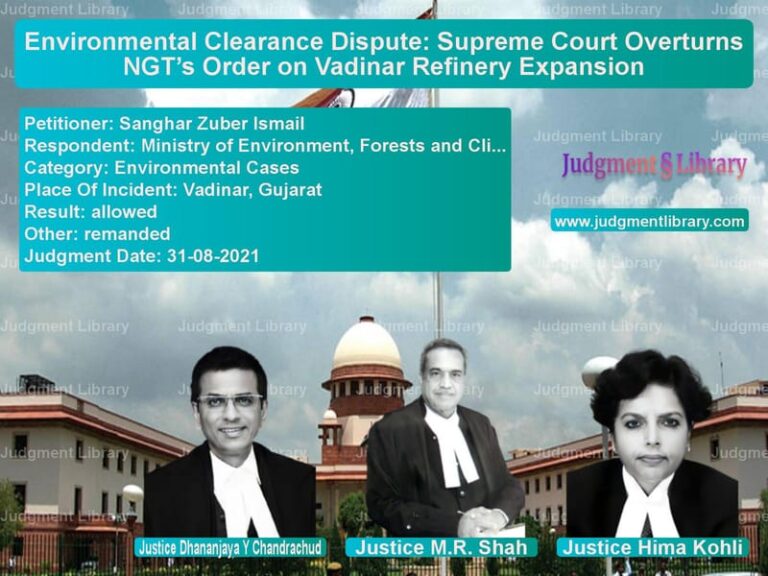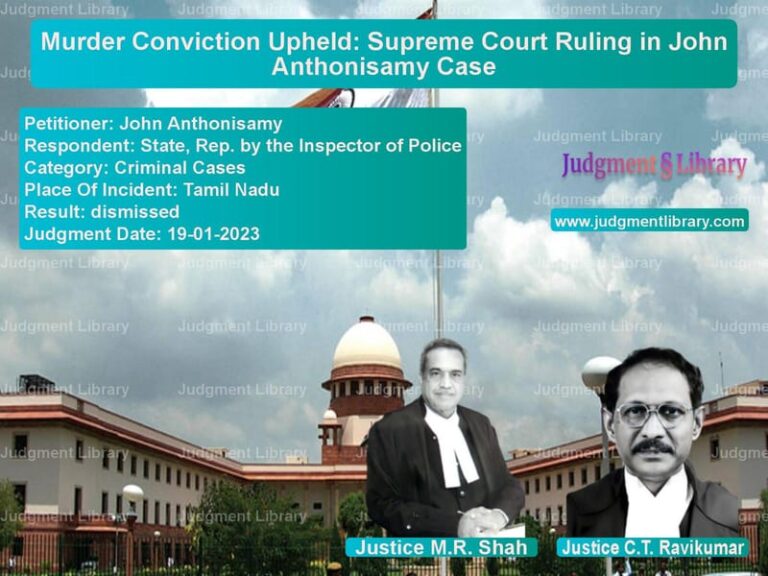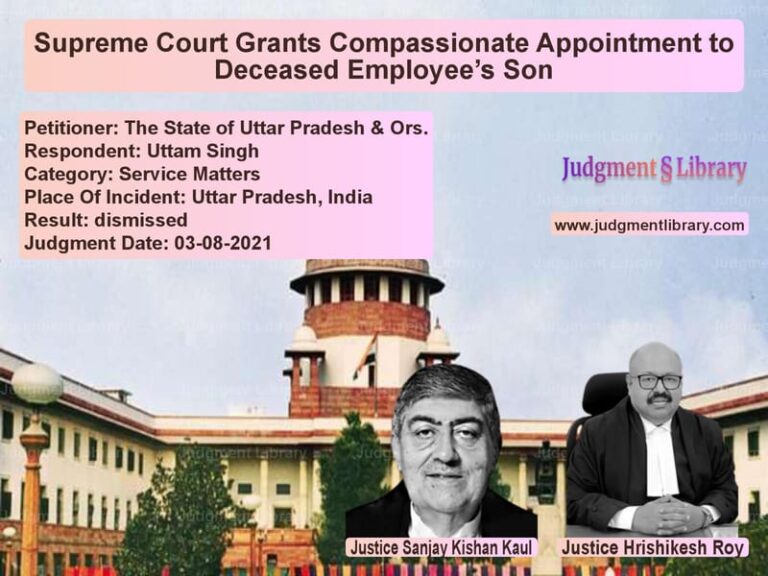Employment Transfers and Standing Orders: Supreme Court’s Landmark Judgment in Divgi Metal Wares Ltd. vs. Employees Association
The Supreme Court of India has delivered a significant ruling in the case of M/s. Divgi Metal Wares Ltd. vs. Divgi Metal Wares Employees Association, addressing critical issues related to employee transfers, standing orders, and industrial employment rights. The judgment highlights the balance between employer rights and employee protections in transfer matters while reinforcing legal principles related to standing orders and labor laws.
The case primarily revolves around whether an employer can transfer employees from one factory to another under the terms of appointment letters and standing orders. The dispute arose when the management of Divgi Metal Wares Ltd. transferred workers from its Sirsi, Karnataka factory to Pune, Maharashtra, and the employees challenged the validity of such transfers.
Background of the Case
The legal conflict began when the employer, M/s. Divgi Metal Wares Ltd., decided to transfer a section of its workforce due to operational requirements. The company, which manufactures automobile gears, operates in multiple locations, including Pune and Sirsi. The employees, represented by the Divgi Metal Wares Employees Association, contested the transfers, arguing that they were illegal and in violation of the standing orders governing their employment.
The Karnataka High Court’s Division Bench had previously ruled in favor of the employees, stating that the standing orders did not permit such transfers. The employer, dissatisfied with this decision, approached the Supreme Court, seeking clarity on the matter.
Key Legal Issues in the Case
The Supreme Court examined several crucial legal questions, including:
- Whether the employer had the right to transfer employees under the terms of the standing orders?
- Whether modifications made to the standing orders in 1999 were legally enforceable?
- Whether employees’ refusal to accept transfers constituted misconduct?
- The relevance of previous Supreme Court rulings, especially in Cipla Ltd. vs. Jayakumar R.
Arguments of the Petitioner (M/s. Divgi Metal Wares Ltd.)
The petitioner, M/s. Divgi Metal Wares Ltd., put forward the following arguments:
- The company had a right to transfer employees as per their employment contracts and the certified standing orders.
- Each employee’s appointment letter contained a specific clause stating that they could be transferred to any company location.
- The Karnataka High Court misinterpreted the standing orders and overlooked the contractual obligations signed by employees.
- The modification of the standing orders in 1999, which attempted to limit transfer rights, was legally incorrect and should not apply retroactively.
Arguments of the Respondent (Divgi Metal Wares Employees Association)
The respondents, represented by their trade union, contested the transfer orders on the following grounds:
- The standing orders did not explicitly allow for inter-location transfers.
- The modification in 1999, which removed the provision allowing transfers, was valid and binding.
- The employer’s decision to transfer workers was arbitrary and amounted to unfair labor practices.
- Workers had a right to challenge transfers that affected their employment conditions.
Supreme Court’s Key Observations
The Supreme Court made several crucial observations in its ruling:
“The law laid down in Cipla Ltd. (supra) clearly states that when appointment letters and standing orders are read together, employee transfers cannot be deemed illegal unless expressly prohibited by law.”
The Court further noted:
“The Karnataka High Court erred in disregarding the contractual terms agreed upon by the employees. An employer has the right to structure its workforce in a manner that meets operational requirements, provided such transfers do not violate fundamental labor rights.”
Final Judgment by the Supreme Court
The Supreme Court ruled in favor of M/s. Divgi Metal Wares Ltd. and overturned the Karnataka High Court’s decision. The Court upheld the company’s right to transfer employees, provided such transfers adhered to the terms specified in appointment letters and standing orders.
Read also: https://judgmentlibrary.com/supreme-court-rules-on-pension-benefits-for-retired-high-court-judge/
The key points of the ruling include:
- The standing orders must be read in conjunction with the terms of appointment.
- The 1999 amendment, which attempted to restrict transfers, was ineffective in negating previously agreed-upon employment contracts.
- Employees cannot refuse transfers if they have agreed to such conditions in their employment contracts.
- The Karnataka High Court’s ruling misapplied industrial law by failing to consider the legal validity of employment contracts.
Impact of the Supreme Court’s Ruling
The judgment sets an important precedent for Indian labor law by reaffirming that employment contracts and standing orders must be interpreted harmoniously. This ruling safeguards the rights of employers to allocate human resources efficiently while also ensuring that employees’ fundamental rights are protected.
With this verdict, companies operating in multiple locations can now enforce transfer policies without fear of unnecessary legal disputes, provided such policies align with employment agreements and standing orders.
Conclusion
The Supreme Court’s decision in M/s. Divgi Metal Wares Ltd. vs. Divgi Metal Wares Employees Association serves as a landmark ruling in labor law. It clarifies the applicability of standing orders and reinforces the principle that employment contracts must be honored unless they contradict statutory provisions.
This ruling will likely influence future disputes concerning employment transfers and the interpretation of labor regulations in India.
Petitioner Name: M/s. Divgi Metal Wares Ltd..Respondent Name: M/s. Divgi Metal Wares Employees Association & Anr..Judgment By: Justice B.R. Gavai, Justice Sandeep Mehta.Place Of Incident: Sirsi, Karnataka.Judgment Date: 21-03-2024.
Don’t miss out on the full details! Download the complete judgment in PDF format below and gain valuable insights instantly!
Download Judgment: ms.-divgi-metal-war-vs-ms.-divgi-metal-war-supreme-court-of-india-judgment-dated-21-03-2024.pdf
Directly Download Judgment: Directly download this Judgment
See all petitions in Employment Disputes
See all petitions in Transfers Cases
See all petitions in Judgment by B R Gavai
See all petitions in Judgment by Sandeep Mehta
See all petitions in allowed
See all petitions in supreme court of India judgments March 2024
See all petitions in 2024 judgments
See all posts in Service Matters Category
See all allowed petitions in Service Matters Category
See all Dismissed petitions in Service Matters Category
See all partially allowed petitions in Service Matters Category







